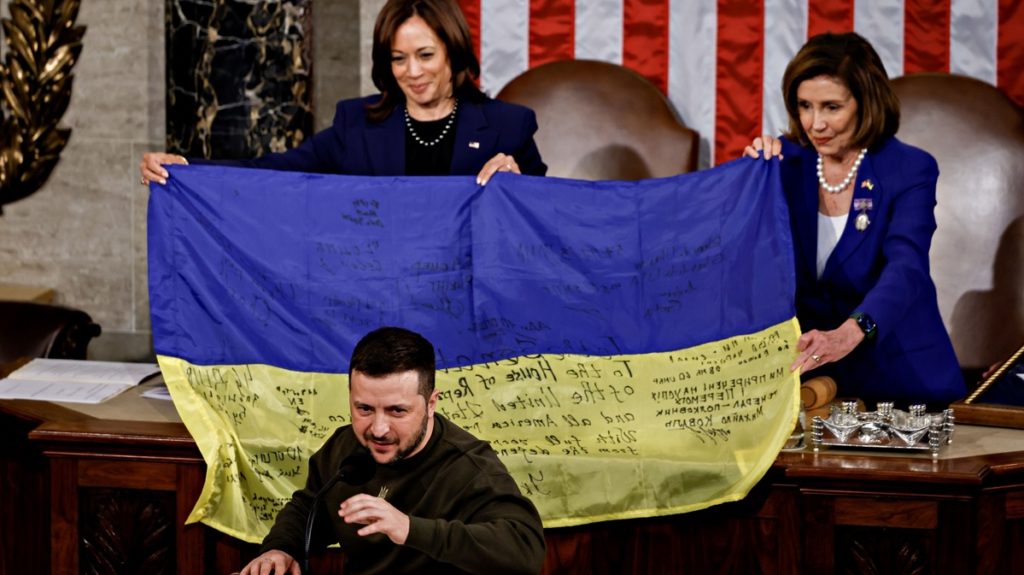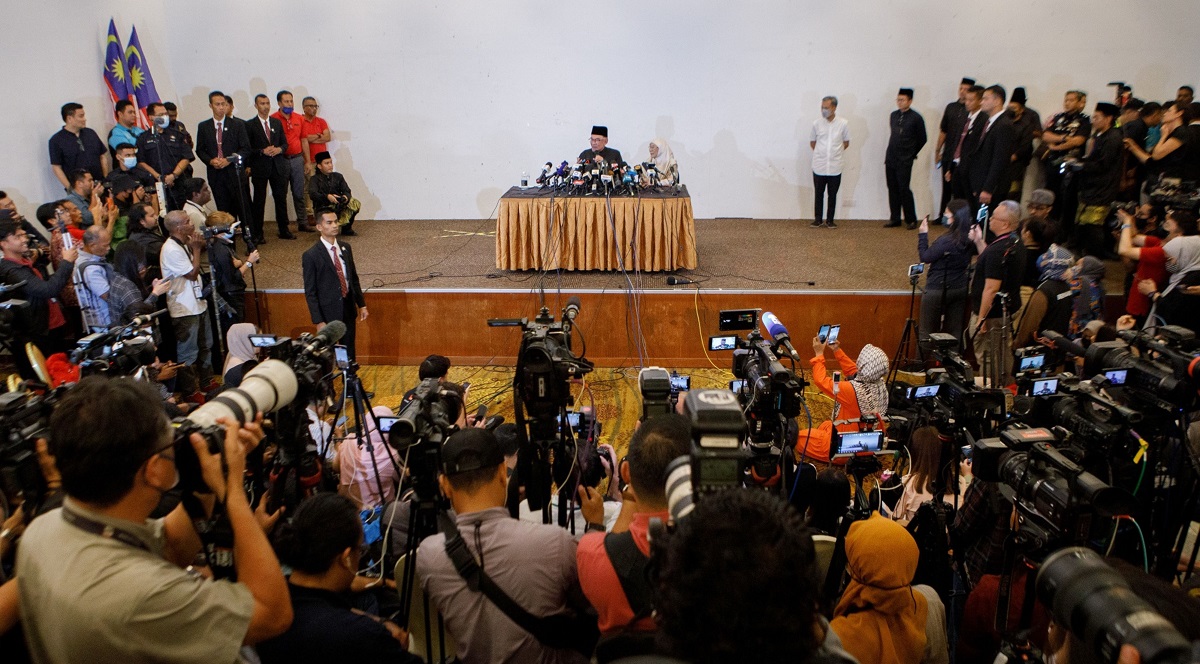US Vice President Kamala Harris (left) and then US House Speaker Nancy Pelosi with Ukraine’s President Volodymyr Zelenskiy last December / Photo: Bloomberg
One unlikely consequence of the stalemated Ukraine war is that it is blunting some of the strategic sharpness that has crept into relations between the US and China. No one is winning the Ukraine war — neither the North Atlantic Treaty Organisation (Nato), America’s chief military footprint in Europe; nor Russia, which invaded Ukraine to deter further Nato footsteps towards the Slavic power’s borders. Therefore, it is not unlikely that events in Europe will buy time for peace in Asia, should the status quo in Europe hold for the foreseeable future.
Why should that be so? To justify my assertion, let me outline the key elements of the situation in Europe before turning to Asia.
The Ukraine conflict has turned into a cruel war of attrition between two Great Powers — America and Russia — for which the hapless Ukrainians are paying the price every day. Their resistance is heroic.
However, it does not detract from the fact that Ukraine has fallen victim in a Great Game for control of the Eurasian heartland. There are no signs that the Russian offensive has “softened” Ukrainian military will and purpose to the point that Kiev would be ready to cede territory, whether lost (as in the Crimea) or contested (as in the Donbass) to buy peace with its neighbour. Equally, however, the war has not weakened the Russian economy or society to a degree that would make the Kremlin sue for peace — if nothing but to renovate the unsteady foundations of President Vladimir Putin’s praetorian rule.
Two scenarios
This stalemate could be broken by a decisive Ukrainian offensive that would bring home to Moscow the pointlessness of an expensive and unwinnable war. However, that scenario is unpersuasive because hefty international sanctions and shrill diplomatic opprobrium have failed to dislodge Russia from the stubborn position that its “operations” in Ukraine are a pre-emptive move against further Nato encroachment.
The opposite scenario is plausible but horrendous to contemplate: Russia’s use of nuclear or chemical weapons to break the stand-off with Nato. Russia has the largest nuclear arsenal in the world. Weapons exist to be used. The nuclear option was exercised by the US against Japan in 1945. Outlawed chemical (and biological) weapons remain on the military menu of many states. Saddam Hussein’s Iraq and contemporary Syria provide abhorrent examples of the use of banned weapons.
There is a military rationale that prevents Russia from using weapons of mass destruction in the Ukraine war. It is that — unlike Japan, which was attacked by the sole nuclear power at the time — a nuclear attack on Ukraine today might elicit a commensurate response from Nato, which is nuclear-armed to its American, British and French teeth.
This is why the impasse in Europe is a genuine one. It signals the arrival of a moment of recognition for all Great Powers to take stock of their wider global options. This is where Asia might benefit from the stalemate in Ukraine.
The logic of that connection is manifested in one of the greatest assertions in modern history. It comes from the consummate historian AJP Taylor, and is made in his book, The Struggle for Mastery in Europe, 1848- 1918. Speaking of Europe since the end of the 15th century, Taylor recognises that “each individual state in Europe acknowledged no superior and recognized no moral code other than that voluntarily accepted by its own conscience. In theory each state could justify itself only by being able to resist with force the forcible encroachments of others”.
Hence, European history could have been one of uninterrupted war. However, it was not. “In fact, Europe has known almost as much peace as war; and it has owed these periods of peace to the Balance of Power. No one state has ever been strong enough to eat up all the rest; and the mutual jealousy of the Great Powers has preserved even the small states, which could not have preserved themselves. The relations of the Great Powers have determined the history of Europe,” says Taylor.
Likewise, the relations of the Great Powers determine the history of Asia today. Those Powers are essentially the US, China, Russia, Japan and India. They combine, in different degrees, military, economic and demographic prowess in a way that sets them apart from the next tier of countries — Middle Powers such as Australia, Indonesia and Vietnam. Four out of the five Great Powers (the US, China, Russia and India) are nuclear; two of them (the US and China) lead the world of economics; and China and India are the two most populous countries. How these five countries conduct their relations cannot but draw from the wartime experience of the Great Powers in contemporary Europe.
Asian theatre
The European stalemate suggests that neither Washington nor Beijing will be tempted to make an offensive move in the Asian theatre for the time being. China (which like Russia defines itself and is defined in the context of its rivalry with the US) is unlikely to move aggressively against Taiwan. This is because Russian setbacks in the Ukraine war reveal how unexpectedly well a smaller entity can fight back once it is supported by external powers. Hardly anyone thought that Ukraine would be able to hold out to Russia for long. But it is doing so and, short of using nuclear or other mass weapons in an act of desperation, Russia cannot hope to win the war.
There are implicit comparisons between Ukraine and Taiwan. Taiwan does not possess the strategic depth of Ukraine, but it has a credible military deterrent that is determined to prevent a takeover of the island. Taiwan has the tacit military backing of the US, which itself has treaty relationships with Japan, South Korea, the Philippines and Australia. India is not a treaty ally of the US, but India’s tense military relations with China do place it on the diplomatic map of an Asia that will have to fall into place, one way or another, in any Sino-American conflict. India possibly cannot go to the Chinese side.
China has only North Korea. North Korea’s military (including nuclear) capabilities are not negligible on their own, but they add very little to China’s own strategic arsenal. In a word, very few Asian nations worthy in military terms will line up behind China in the event of an armed conflict between it and the US. If nothing else, this fact of military geography would cast a long shadow on any Chinese attempt to launch a pre-emptive attack on Taiwan.
The military calculus is no less complicated for the US. Even if Russia retreats from Ukraine, it will remain a Great Power. Unless Russia breaks apart, as the Soviet Union once did, it will be a Great Power whose nuclear arsenal could devastate the US. Hence, no matter which way the Ukraine war goes, Russia will remain a formidable adversary, certainly in the short to medium term. Even regime change brought on by war will leave nationalist Russia an embittered enemy, waiting for its next chance to avenge itself on America and its Western allies for a lost war in Ukraine.
Likewise, even a China which loses in the test of wills with America over Taiwan will not cease to be China. In fact, even the collapse of the Chinese Communist Party (like the erstwhile Communist Party of the Soviet Union, or CPSU) might not produce a pro-Western China. The disappearance of the CPSU did not create a pro-Western Russia. How else is it possible that Russia has gone to war with the West in just over three decades since the fall of the Berlin Wall? That fall was celebrated (prematurely) as the final victory of capitalism over communism. The West and Russia are both capitalist. Yet they are at war.
Americans who take the long view of history — as the Chinese certainly do — would understand that proxy wars, to say nothing of half-proxy wars, do not last long. Ukraine is a half-proxy war between Nato and Russia: Ukranians are waging Nato’s war, but Russians are fighting their own. Any war over Taiwan would reflect the Ukrainian model: Taiwanese would wage America’s war, and the Chinese would fight their own.
Such wars do not last long. National interests last longer. Relations between two Great Powers — the US and Russia — will continue long after the Ukraine war has entered the footnotes of global history. Any war over Taiwan will disappear similarly from historic memory, and Great-Power relations between America and China will resume. This should give Taiwan pause for thought, as it should have given Ukraine once.
Looking ahead, it would be best if America and China could reset their relations in the realist light of the Ukrainian impasse. Competition is natural: Rivalry does not have to be. China does not wish to overthrow America’s domestic system, based on the twin promises of economic and political freedom. China wants an America that desists from subverting the Chinese domestic system in the name of democracy.
Globally, China certainly wants to reduce America’s hegemonic influence and perhaps to even replace it some day. However, China does not seek to do so through war. This is primarily because China does not possess the capability to wage total war against the US. Equally, however, China does not want a halfproxy war over Taiwan to derail the national progress it has made since the end of dismal communist rule. The stalemated Ukraine war has bought time for Asia. Let us all hope that the time will be used wisely.




